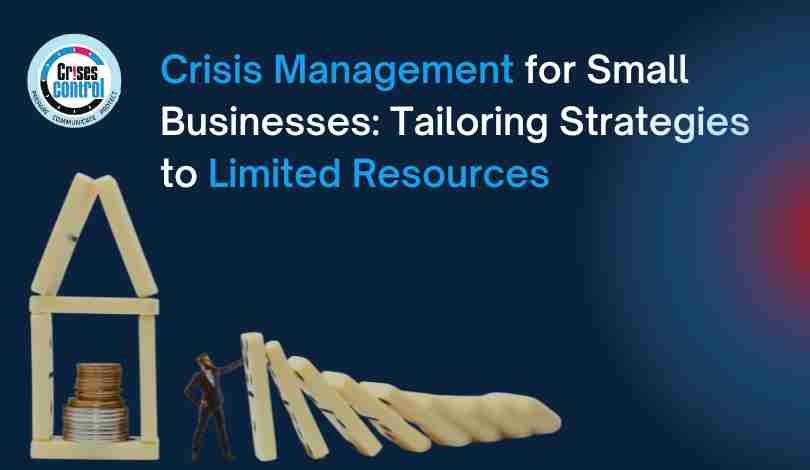In today’s dynamic business environment, crisis management plays a pivotal role in ensuring the survival and success of organisations. While crisis management is often associated with larger corporations, it is equally, if not more, important for small businesses. This blog will explore the significance of crisis management for small businesses, debunk misconceptions about its relevance to limited resources, provide tailored strategies for effective crisis management, highlight the role of technology in crisis management, and introduce the benefits of using Crises Control for effective crisis management.
The Importance of Crisis Management for Small Businesses
Why Crisis Management is Crucial for Small Businesses
Crisis management is especially critical for small businesses due to their inherent vulnerability to external and internal risks. Unlike larger organisations that may have more resources to absorb the impact of a crisis, small businesses often operate on a tighter budget and have limited personnel. As a result, even a minor crisis can have a significant and long-lasting impact on their operations, reputation, and financial stability.
Crisis Management: Not Just for Big Organisations
Contrary to popular belief, crisis management is not exclusive to large organisations. In fact, small businesses can benefit greatly from proactive crisis management strategies. By preparing for potential crises in advance, small businesses can minimise the negative consequences and increase their chances of swift recovery. Effective crisis management enables small businesses to protect their brand reputation, maintain customer trust, and ensure business continuity.
The Misconception: Crisis Management and Limited Resources
Some small business owners may assume that crisis management is a luxury reserved for organisations with ample resources. However, crisis management is an essential investment regardless of budget limitations. While it may require a strategic allocation of resources, the potential cost savings and long-term benefits outweigh the initial investment. By proactively managing crises, small businesses can avoid or mitigate potential damages that could be far more costly to rectify later.
Tailored Strategies for Effective Crisis Management
Risk Assessment and Mitigation
Small businesses should conduct a comprehensive risk assessment to identify potential threats and vulnerabilities. By evaluating external factors such as market volatility, supplier reliability, and natural disaster risks, as well as internal factors like data security vulnerabilities and operational weaknesses, small businesses can develop targeted strategies to mitigate or respond to potential crises. This may involve establishing backup systems, diversifying suppliers, implementing cybersecurity measures, and creating contingency plans.
Communication and Stakeholder Engagement
Open and transparent communication is essential during a crisis. Small businesses should establish clear communication channels with employees, customers, suppliers, and other stakeholders. It is crucial to provide timely updates, accurate information, and reassurance to maintain trust and manage expectations. Utilising various communication platforms such as email, social media, and dedicated crisis management tools can ensure effective and coordinated communication across different channels.
Resource Allocation and Prioritisation
With limited resources, small businesses must allocate them wisely during a crisis. Prioritising critical functions and key processes is essential to maintain business continuity. Small businesses should identify and allocate resources based on the potential impact of a crisis, ensuring that essential operations can continue despite disruptions. This may involve cross-training employees, securing alternative supply chains, and investing in backup infrastructure or equipment.
Continuity Planning and Business Resilience
Small businesses should develop continuity plans to outline steps and procedures to be followed during a crisis. These plans should include contingencies for different scenarios and consider potential recovery strategies. By anticipating potential disruptions, small businesses can reduce downtime and minimise the impact on operations. Additionally, fostering a culture of resilience and adaptability within the organisation can help employees respond effectively to unexpected challenges.
Leveraging Technology for Effective Crisis Management
In today’s digital age, technology plays a vital role in crisis management for small businesses. Various software solutions and platforms provide streamlined communication, real-time monitoring, and efficient response mechanisms. By leveraging technology, small businesses can enhance their crisis management capabilities and make the most of their limited resources. These technological tools enable effective coordination, information sharing, and data analysis, empowering small businesses to respond swiftly and decisively during a crisis.
Introducing Crises Control: Benefits for Small Businesses
One such technology solution tailored for small businesses is Crises Control. This comprehensive crisis management platform offers numerous benefits that align with the specific needs and challenges of small organisations.
Scalability and Flexibility
Crises Control allows small businesses to scale their crisis management efforts according to their unique requirements. Whether a small business has a handful of employees or a growing workforce, the platform can accommodate the changing needs and evolving nature of crises. This scalability ensures that small businesses can effectively manage crises regardless of their size or growth trajectory.
Enhanced Security Measures
Data security is a paramount concern for small businesses. Crises Control provides robust security measures to safeguard sensitive information and ensure the integrity of crisis management processes. With built-in encryption, secure cloud storage, and access controls, small businesses can have peace of mind knowing that their crisis management efforts are protected against unauthorised access or data breaches.
Streamlined Communication and Collaboration
Effective communication is the cornerstone of crisis management. Crises Control offers intuitive communication features that enable small businesses to quickly disseminate critical information to relevant stakeholders. The platform facilitates real-time collaboration, ensuring seamless coordination between teams and departments during a crisis. With Crises Control, small businesses can communicate swiftly, make informed decisions, and respond proactively to emerging situations.
Conclusion
In conclusion, crisis management is of utmost importance for small businesses, regardless of their limited resources. By understanding the significance of crisis management, debunking misconceptions, implementing tailored strategies, leveraging technology, and utilising platforms like Crises Control, small businesses can effectively navigate through crises, protect their operations and reputation, and ensure their long-term success.
Take proactive steps today to safeguard your small business. Request a live demo or get in touch with our experts at Crises Control to explore how our platform can empower your organisation in crisis management.








